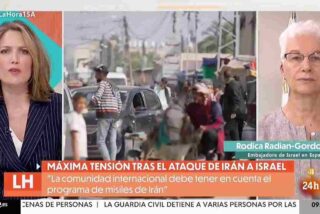El titular ‘In Spain, a Call to ‘Free Our Children’ From Coronavirus Confinement‘ (En España, una llamada a liberar a nuestros hijos del encierro de coronavirus) quita el aliento.
El subtitulo ‘The strictest lockdown measures in Europe have left countless children bored, exhausted and sometimes depressed’ (Las medidas de bloqueo más estrictas en Europa han dejado a innumerables niños aburridos, exhaustos y a veces deprimidos), produce sudores.
Pero el escalofrío llega cuando ves la foto con la que el sacrosanto The New York Times presenta al mundo a la ‘infancia española‘ del socialista Pedro Sánchez.
En el pie de la imagen, hecha por Samuel Aranda y presenta a una ‘típica familia‘ española confinada en estos tiempos de coronavirus, explica: «Mafus Rohman y su esposa, Samina, viven en un apartamento de dos habitaciones en Barcelona con una prima y sus gemelas de 5 años, Misha y Maliha».
El largo reportaje va firmado al alimón por Elian Peltier y Raphael Minder, el desinformado corresponsal independentista y podemita que el rotativo estadounidense tiene en España y Portugal.
En la nota se hace hincapié en que el Gobierno socialcomunista PSOE-Podemos ha impuesto las medidas más estrictas de bloqueo en todo el continente europeo y que ello que terminado con los niños «aburridos, agotados y a veces deprimidos«.
La descripción y sobre todo la foto dan una estampa deplorable de la España de Sánchez, a lo que contribuye la familia ‘tipo‘ que Minder y su colega han elegido.
Hay otras cuatro imágenes, de balcones, calles desiertas, una madre y su niña y un columpio solitario, pero la que abre la nota es definitiva
El diario compara la situación española con la italiana:
«Incluso en la mayoría de Italia, el país con el peor impacto del continente con respecto al número de muertos, los padres pueden sacar a los hijos a dar un pequeño paseo».
Y se pregunta cómo puede ser que los padres «puedan sacar al perro y no al hijo».
In Spain, a Call to ‘Free Our Children’ From Coronavirus Confinement
The strictest lockdown measures in Europe have left countless children bored, exhausted and sometimes depressed.
By Elian Peltier and Raphael Minder
April 18, 2020
BARCELONA, Spain — For five weeks, Lia Aparicio Cenador hasn’t been outside once.
“I’ve forgotten what it’s like to be on a street,” said Lia, a 9-year-old girl.
Millions of children in Spain, stuck at home since the authorities implemented a nationwide lockdown in mid-March, have been unable to exercise outside, take a short walk around their block, go with their parents to the supermarket or leave their house except for medical reasons.
Such measures, the strictest in Europe, have left countless children bored, exhausted and sometimes depressed.
As Spanish authorities have extended the lockdown into May, calls to ease confinement rules for children have recently intensified, as many parents and health specialists raise the alarm over the long-term consequences confinement will have on their physical and mental health. Even in most of Italy, the worst hit country on the continent in terms of number of deaths, parents can take their children out for a short walk.
“Parents can be angry,” said Diego Figuera, a psychiatrist at the San Carlos hospital in Madrid who works with children. “How do you explain to them that you can take your dog out, but not your child?”
Mr. Figuera said that public health experts and epidemiologists had advised Spain’s health ministry to confine children at the onset of the crisis because they were concerned that children could pass the virus to older people.
This week, Spain, which has reported over 20,000 deaths from the virus, began easing some aspects of its lockdown, allowing construction sites and factories to reopen. Public transportation in large cities like Madrid or Barcelona has grown a little busier, but the sight of parents pushing strollers or holding a child’s hand has yet to return.
On Saturday, Pedro Sánchez, Spain’s prime minister, said that some children will be able to go outside after April 27, as he announced another extension of the lockdown until May 9. Mr. Sánchez didn’t specify what exact leeway children would receive to step outdoors, but he suggested it would likely apply for those up to the age of 12. Mr. Sánchez’s announcement came amid mounting criticism from parents and health specialists, backed by some regional politicians, who have all warned that keeping children strictly indoors could harm their mental and physical health.
Alejandra Raventós, a psychologist and the director of the Anne Foundation, a nonprofit that helps disadvantaged children, said she had been “angered and shocked” at the lack of consideration given to children’s well-being when the lockdown was implemented in mid-March.
As a mother of three and through her work at the Anne Foundation, Ms. Raventós said she was witnessing difficulties among some children, from nutrition to sleeping problems, as well as strong mood swings. For others, Ms. Raventós said, the “big risk is that boredom turns into complete apathy,” particularly given the lack of physical movement and variety in their activities.
As Spain will remain under lockdown until May, public pressure mounted in recent days to ease the rules for children, and some Spanish regions are now working on plans to allow them outdoors.
“If adults can go for a walk with a dog, and now some nonessential economic activities are resuming, why do our boys and girls have to keep waiting?” Barcelona’s mayor, Ada Colau, wrote on Facebook, urging the authorities to “free our children.” The hashtag #NiñosEnLaCalleYa, or “children on the streets now,” has circulated widely on social media.
Regional authorities in the Madrid region suggested this week that children under 14 should be allowed to go out for an hour once a day, but without their bicycle or scooter.
But the Madrid plan, as well as those outlined by other regions, would still need approval from the central government.
In the meantime, parents are doing their best to keep their children busy and happy.
“She has adapted, but it’s traumatizing,” said Elena Parreño, who said her daughter, Maya Herrero, 7, had no energy and had experienced so many nightmares since the confinement started that she now sleeps with her and her husband. Maya said in a telephone interview that she missed walking outside and going to her weekly swimming sessions.
Sign up to receive an email when we publish a new story about the coronavirus outbreak.
“It’s a little bit like being in a prison,” Ms. Parreño said about the situation for children. “They’re surviving.”
When Ms. Parreño took Maya on a short walk, defying the government’s ban, Maya called her the “best mother in the world,” Ms. Parreño said.
Mr. Figuera, the psychiatrist in Madrid, said the psychological impact of confinement could affect children long term.
“After months of lockdown, we may ask 4-year-olds to put on a mask at an age when smiling is the most important form of social interaction,” said Mr. Figuera, who is among a group of experts advising the Spanish government on easing lockdown measures for children. “That new normality, which is abnormal, will leave children traumatized.”
Sara Jiménez, a dietitian and nutritionist, said some families were no longer sticking to strict meal timetables and also indulging their children. “The shopping basket gets filled with pastries and bad quality products to keep children happy during this period,” she said.
Many children started the lockdown feeling agitated, parents say, but then boredom sunk in. “Being alone is very hard,” said Lia, the 9-year-old, who is an only child. She said she had stopped calling her friends because she had “nothing more to tell them” and preferred to play alone. “It’s been long, very long,” she added.
The lockdown has likely hit low-income families especially hard, since many live in cramped quarters.
Mafus Rohman and his wife, Samina, share a two-bedroom apartment with their 5-year-old twins, who sleep in their bedroom, and an older family relative who sleeps in the other one. Mr. Rohman runs a bar that he has been forced to shut down during the lockdown, and he said that he couldn’t afford to pay the rent this month.
“They keep asking what’s going on,” Mr. Rohman said at his apartment as the twins, Misha and Maliha, colored pictures nearby. “At least we are all together.”
The children who may be at the most risk of suffering long-term effects from the lockdown, said Mr. Figuera, the psychiatrist, are those who were in therapy before the coronavirus crisis hit.
Children with autism, for example, are given an exemption that allows them to go out with a parent, but some families say they have tried to keep them inside to protect them.
“If I take him out and tell him that no, we can’t go to the park, that no, we can’t go to school, or that he can’t see his grandparents, he’s going to have a meltdown,” said Anais Sanchez of her 8-year-old son, Odaï Abdeldayem, who has autism.
Ms. Sanchez, 32, who was supposed to start a job as a school cook but lost it when the lockdown started, said she had to tell her son that “something bad” was going on outside and that they couldn’t leave their apartment in La Trinitat Nova, one of Barcelona’s poorest neighborhoods.
Odaï has had nightmares and bouts of anger since the lockdown started, his mother said. “He keeps asking when this is going to be over, and I don’t know,” Ms. Sanchez said from the doorstep of the family apartment. “And I can’t lie to him.”
For children like Odaï who required therapy before the lockdown, online sessions have also had limited effect. Carmen Marco Llana, a child psychologist in Madrid, said she was struggling to treat her younger patients, particularly those below the age of about 8, some of whom suffered from attention deficit disorder, “because our sessions are always very dynamic and they are suddenly asked to concentrate long in front of a screen.”
Like other specialists, Ms. Marco Llana said the children were “really the abandoned ones in this crisis,” whose needs were ignored when the lockdown was decided.
“I understand that we got hit by this like a Tsunami wave,” Ms. Marco Llana said. “But now that we are moving out of the real emergency phase, I think that we can begin to see issues that were not fully taken into account at the start, including our children.”
Elian Peltier reported from Barcelona, and Raphael Minder from Madrid.











































